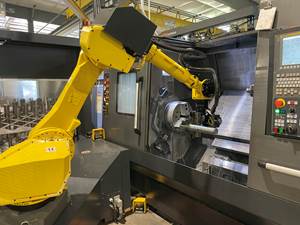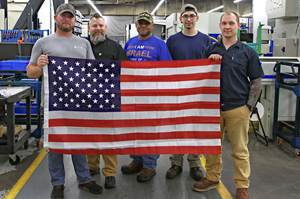Recruitment Machines
Are you involved in a robotics league? These competitions attract and identify young people who could thrive in a manufacturing career.
Share






Here is an irony that’s hard not to love: Contrary to the fear that robots might discourage manufacturing jobs, robots are actually proving to be one of the best resources for drawing young people toward manufacturing careers. I hear this from employers who support competitive robotics programs such as FIRST Robotics or the .
Jergens is an example. The maker of workholding systems routinely supports a team within , northeast Ohio’s branch of the ’s National Robotics League. The league consists of teams of high schoolers working with company coaches to design and build remote-controlled robots that do battle in tournaments. AWT RoboBots is overseen by the Alliance for Working Together, a manufacturers’ group in the region.
Ryan Ponsart, 19, is a past member of Jergens’s AWT RoboBots team whose participation led to the company offering him a job. On the team, he made parts for the robot on Jergens’s equipment under the company’s supervision. It was a great experience, he says, one that solidified and expanded upon what he was learning about machining in his . (If he is not still with Jergens today, that’s only because his other interest is the military. By the time I spoke with him, he had signed on with the Marines.)
Darel Taylor is Jergens’s engineering manager. He coached the RoboBots team the year before Mr. Ponsart joined it. Back then, 11 area companies supported teams. Now, 31 do. He says a company’s motive for sponsoring a team is both community support and self interest, and the two aims blend together. Even if none of the kids on a company’s team turn into employees, the company still benefits from seeing the local manufacturing talent pool expand.
Far away in Calgary, Alberta, Kevin Saruwatari of sees his own company’s recent support of two local FIRST Robotics teams as a similarly promising scouting tactic. Within , he shared a series of posts with other shop owners about his experience with the members of these teams. Like Jergens, he gave the kids hours of access to his shop to make parts for their robots. The team members reached the point where his only role over them was to advise and supervise.
“The program is a good way to meet curious, intelligent, motivated kids,” he says. “My intention is to filter out the really interested kids and offer them ‘build a go-kart’-style projects to try to keep them involved in the off-season.” That is, during the non-robot season.
What is it about robots that succeeds in engaging young people with manufacturing aptitudes? Mr. Taylor has ideas. Part of it is the timeliness—robots are coming into vogue. But he says another part is the type of success that building a robot makes possible. The final system will perform well only if each component is made precisely as designed. In this way, the robot offers a minuature version of the very same challenge and satisfaction that a career in manufacturing will also provide.
Related Content
DN Solutions Responds to Labor Shortages, Reshoring, the Automotive Industry and More
At its first in-person DIMF since 2019, DN Solutions showcased a range of new technologies, from automation to machine tools to software. President WJ Kim explains how these products are responses to changes within the company and the manufacturing industry as a whole.
Read MoreSame Headcount, Double the Sales: Successful Job Shop Automation
Doubling sales requires more than just robots. Pro Products’ staff works in tandem with robots, performing inspection and other value-added activities.
Read MoreFinding Skilled Labor Through Partnerships and Benefits
To combat the skilled labor shortage, this Top Shops honoree turned to partnerships and unique benefits to attract talented workers.
Read MoreBuilding Machines and Apprenticeships In-House: 5-Axis Live
Universal machines were the main draw of Grob’s 5-Axis Live — though the company’s apprenticeship and support proved equally impressive.
Read MoreRead Next
Machine Shop MBA
Making Chips and 91ÊÓƵÍøÕ¾ÎÛ are teaming up for a new podcast series called Machine Shop MBA—designed to help manufacturers measure their success against the industry’s best. Through the lens of the Top Shops benchmarking program, the series explores the KPIs that set high-performing shops apart, from machine utilization and first-pass yield to employee engagement and revenue per employee.
Read MoreAMRs Are Moving Into Manufacturing: 4 Considerations for Implementation
AMRs can provide a flexible, easy-to-use automation platform so long as manufacturers choose a suitable task and prepare their facilities.
Read More


















